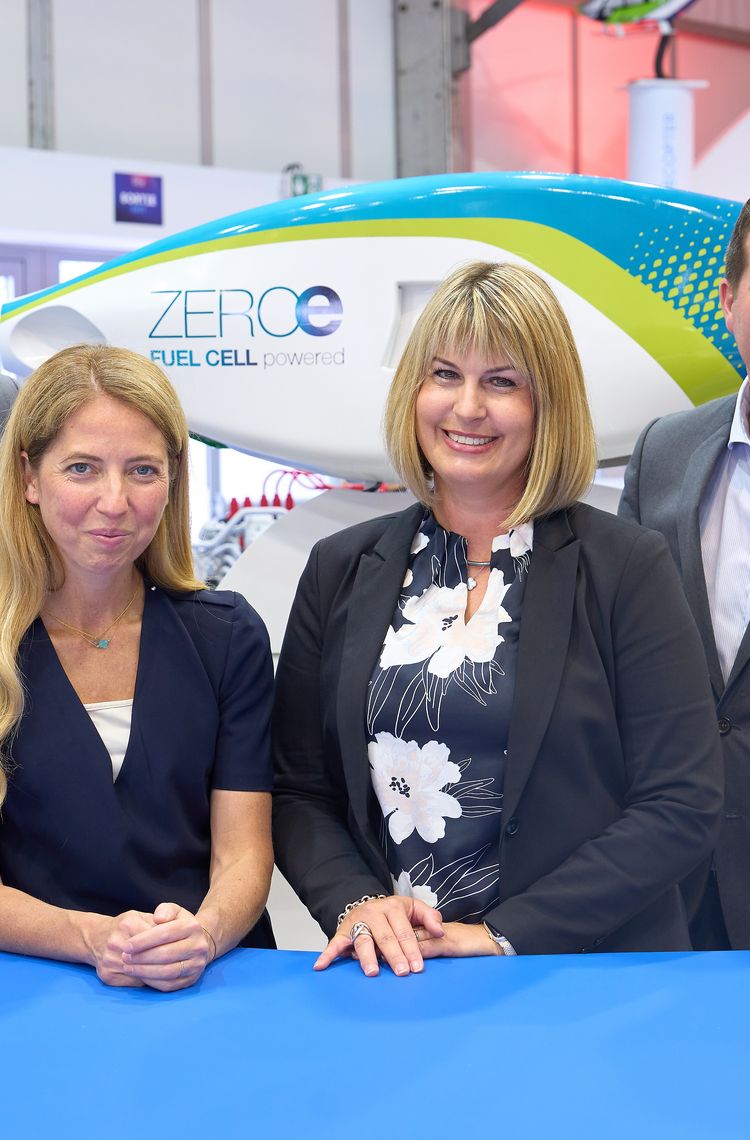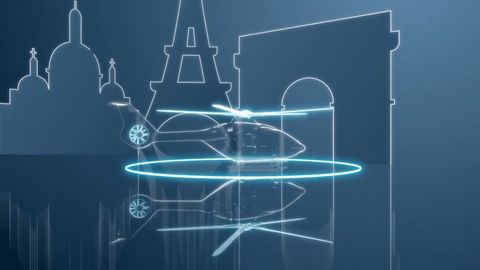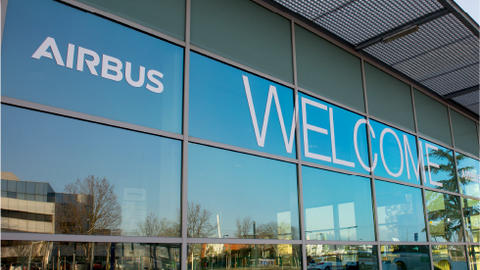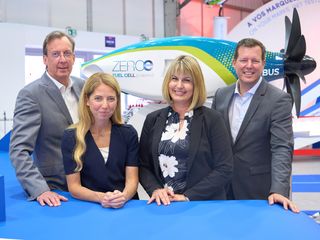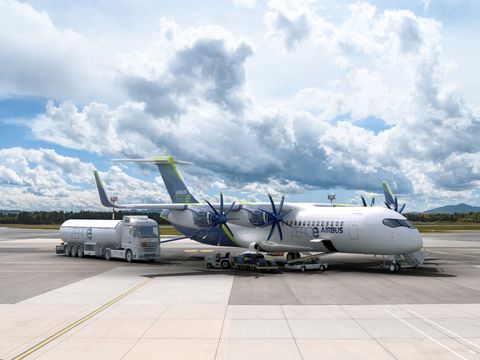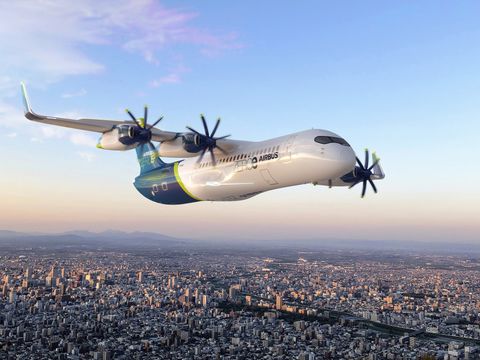Paris, France, 18 June 2025 – Airbus and MTU Aero Engines have signed a Memorandum of Understanding (MoU) to progress together on hydrogen fuel cell propulsion, a promising and critical technology to decarbonise aviation.
This MoU was signed today during the 55th Paris Airshow by Bruno Fichefeux, Airbus' Head of Future Programmes and Dr. Stefan Weber, MTU’s SVP Engineering and Technology.
The partnership draws on the combined expertise of Airbus, a leading aircraft manufacturer and pioneer in hydrogen-powered aviation through its ZEROe project, and MTU Aero Engines, a globally recognised engine expert for commercial and military aircraft. It follows Airbus' decision to focus its research effort on a fully electric, hydrogen-powered aircraft with a fuel cell engine, a field in which MTU has developed recognised expertise through its Flying Fuel Cell concept.
The agreement sets out a three-step roadmap for the development of a hydrogen-powered fuel cell engine suitable for the commercial aviation market. The first step is to mature the technological building blocks essential for the engine through joint research projects, such as Clean Aviation. The second step will involve aligning the two partners' R&T roadmaps on hydrogen technologies. The result of these joint explorations then would allow us to consider a third step towards the development of a fuel-cell engine for a hydrogen powered aircraft.
“Our focus on fully electric fuel cell propulsion technology for future hydrogen-powered aircraft underscores our confidence and progress in this domain," said Bruno Fichefeux, Head of future programmes at Airbus. "Collaborating with MTU, a leader in engine manufacturing and innovation, is a perfect complement to our own advancements. This partnership will allow us to pool our collective knowledge, accelerate the maturation of critical technologies, and ultimately deliver a revolutionary hydrogen-powered propulsion system for future commercial aircraft. Together, we are not just imagining a sustainable future of flight, we are actively pioneering it."
“As a globally recognised engine expert, we are driven by the vision of a revolutionary propulsion concept that allows virtually emissions-free flight,” said Dr. Stefan Weber, SVP Engineering and Technology at MTU Aero Engines. “Today, we are at the centre of a wide-ranging eco-system of partners aiming to achieve the complete electrification of the powertrain by using fuel cell technology. Partnering with Airbus opens up the possibility to jointly address both technology maturity and platform integration aspects. Our joint efforts in the years to come are the first step in paving the way for a potential product development in the future.”
Note to Editors:
Hydrogen has the potential to play a crucial role in decarbonising aviation in the long term, and to bring a revolution in air transport comparable to that of electric vehicles in the automotive sector.
To that aim, Airbus’ ambition is to bring a hydrogen-powered commercial aircraft to market. The ZEROe project was launched in 2020 to explore the feasibility of two primary hydrogen propulsion technologies: hydrogen combustion and hydrogen fuel cells.
In March 2025, during the Airbus Summit, Airbus announced that it was focusing efforts on a fuel cell fully-electric propulsion system. The results of the fuel cell prototype and powertrain testing, as well as research into complementary technology such as cryogenics, supported the viability of this technology.
More information on the ZEROe hydrogen-powered aircraft.
Beyond the aircraft technologies, Airbus will continue to foster the emergence of a hydrogen aviation economy and the associated regulatory framework, which are also critical enablers to the advent of hydrogen-powered flight at scale.
MTU Aero Engines has been making continuous good progress with regard to a fuel cell-related revolutionary propulsion system. It has reached some important milestones over the past months: The design for the company’s Flying Fuel Cell has been nailed down, stack manufacturing for the demonstrator has started, the eMoSys electric motor was successfully tested for the first time, and the first test cell went into operation in Munich.
Beyond this, MTU Aero Engines is leading the Clean Aviation technology project HEROPS (Hydrogen-Electric Zero Emission Propulsion System). Launched in early 2024, HEROPS aims to develop innovative technologies for a climate-neutral, hydrogen-powered electric powertrain based on MTU’s Flying Fuel Cell.
About MTU Aero Engines
MTU Aero Engines AG is a globally recognized expert in commercial and military aircraft engines. MTU‘s high-tech expertise ranges from the development and production of high-quality components to the final assembly of complete engines and the maintenance of aircraft engines and stationary gas turbines. In the financial year 2024, the DAX-listed company generated revenues of 7.5 billion euros. MTU technology can be found providing reliable thrust in one in three commercial aircraft worldwide. And every year, MTU maintains around 1,500 engines and industrial gas turbines. At 19 locations on five continents, more than 13,000 employees from over 80 nations contribute to safe global mobility. Together with other European engine manufacturers, MTU has also been ensuring and supporting the operational readiness of air forces for decades. To continue to benefit from the sustained growth of the aviation industry in the years to come, the company is investing in its expertise, industrial capacities and in future commercial and military engine concepts in Germany and worldwide. With the passion and innovative strength of its employees, MTU is shaping modern aviation – today, tomorrow and in the decades to come.
@Airbus #MTUAeroEngines #hydrogen #zeroe #futureaircaft #PAS25
Contacts
Philippe Gmerek
AIRBUS
Elsa Gobet
AIRBUS
Markus Wölfle
MTU Aero Engines
The latest Innovation news
Continue reading
Singapore to establish world’s first airport testbed for next generation propulsion…
Press Release
Innovation
Civil Aviation Authority of Singapore, CFM International and Airbus sign MOU to prepare the aviation ecosystem for next generations of aircraft
How Airbus is pioneering aircraft manufacturing with Titanium 3D printing
Web Story
Innovation

Recycled and ready
Web Story
Innovation

Expanding 5G connectivity with the Airbus UpNext SpaceRAN demonstrator
Web Story
Innovation

Driving innovation at Airbus Helicopters
Web Story
Helicopters
